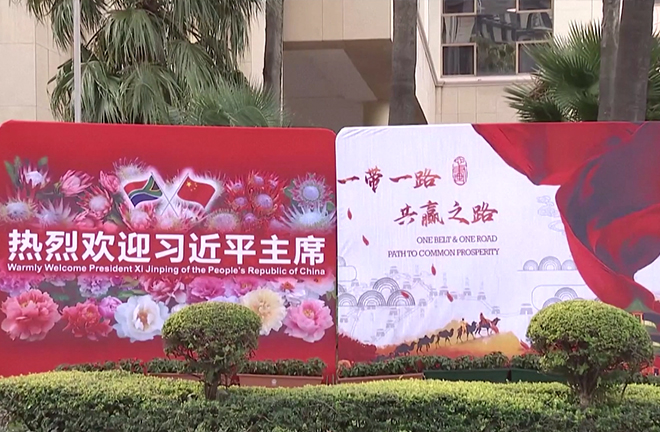China’s demeanor sets course for BRICS cooperation

A screenshot shows posters on a street in Johannesburg, South Africa, prior to the 15th BRICS Summit on Aug. 21. Photo: CFP
The 15th BRICS Summit, which was convened in Johannesburg, South Africa, on Aug. 22–24, continues to generate ongoing discussions. China’s actions and initiatives, and demeanor during the summit have garnered significant attention worldwide, receiving warm applause from overseas media and international academia.
Recently, three scholars were interviewed by CSST: Michael Dunford, Professor Emeritus from the School of Global Studies at the University of Sussex in the United Kingdom; Luís Antonio Paulino, an expert in China studies from Sao Paulo State University in Brazil; and Yusuf Ali Zoaka, a professor of political science and international relations from the University of Abuja in Nigeria. During the interviews, these scholars spoke highly of China’s remarkable performance in the summit and beyond, while sharing their optimism about the promising prospects and significant potential of BRICS cooperation.
During the summit, China made significant announcements regarding its initiatives, such as the establishment of the Global Development and South-South Cooperation Fund, which has a total value of $4 billion (roughly 29.2 billion yuan), and the planned creation of the China-BRICS Science and Innovation Incubation Park for the New Era.
“China plays an irreplaceable role in the BRICS framework and has made substantial efforts to improve the BRICS mechanism and cooperation in recent years,” Zoaka told CSST.
As one of the founding members of BRICS, China has actively contributed to the development and expansion of the group. It has advocated for increased trade and investment among member countries, leading to the establishment of the New Development Bank and the Contingent Reserve Arrangement.
“These institutions provide financial support for infrastructure projects and help member countries tackle financial crises, reducing their dependence on traditional Western-dominated institutions like the World Bank and IMF,” Zoaka said. He added that China has also initiated projects like the BRICS Action Plan for Innovation Cooperation (2017–20), which aims to foster technological innovation and industrial cooperation among member countries.
Dunford expressed admiration toward China’s commendable efforts in enhancing the status of BRICS in recent years. He highlighted China’s role in providing an effective platform for member states to engage in discussions and coordination on a wide range of global issues.
China has actively participated in multilateral forums within the framework of the United Nations and other international organizations, acting as a collective voice for BRICS in global governance, Dunford said. “China has proposed the Belt and Road Initiative, the Global Development Initiative, the Global Security Initiative, the Global Civilization Initiative, and it is translating the vision of a Human Community with a Shared Future into reality.”
“China has always taken concrete actions in addressing contemporary world problems and deficits. It is also envisaging a different type of harmonious international system rooted in Chinese concepts of ‘All under heaven’ (tiānxià, 天下), and ‘symbiosis’ (gòngshēng, 共生) and a vision of the world in which the success of one country can only be guaranteed by the success of all,” Dunford commented.
From Paulino’s perspective, no country in the group has paid more attention to improving the BRICS mechanism and deepening cooperation between its members than China. Despite already being economically and politically strong, China recognizes the importance of this cooperative framework of BRICS and actively works toward strengthening it.
China always regards itself as part of the Third World. It will continue to do so even when it is prosperous and powerful, because it shares a common destiny with all Third World countries. “China will never seek hegemony or threaten anyone, but will always be on the side of the Third World,” Paulino stressed.
Dunford pointed out that the establishment of BRICS was in part a major step in the attempt by countries of the Global South to address obstacles to their own development and increase South-South trade in a world which remained in many respects a unipolar world order.
In the past, many of them had no choice but to accept the rules that were made for them due to the absence of alternative centers of economic and political power outside the West. But this situation has changed, Dunford said. “On the one hand, the West has collectively been in relative economic decline since the 1970s and its social model has been significantly less dynamic and attractive. On the other hand, a number of emerging economies have made remarkable economic progress. This progress reflects their ability to assert a degree of sovereignty.”
Edited by CHEN MIRONG

 PRINT
PRINT CLOSE
CLOSE